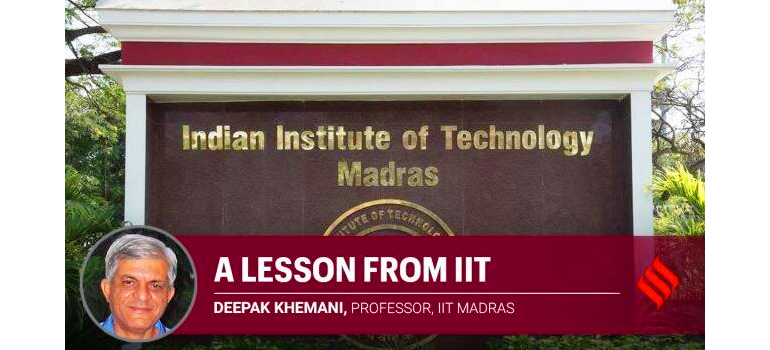
“Popular perception creates a ranking of the different courses offered by different IITs. Students, most often advised by their parents, typically pick the “highest” course that they can get based on their rank. Any intrinsic interest a student may have in a particular subject becomes collateral damage,” writes Professor Khemani
In ancient Greek mythology, Dionysus is the god of grape harvest and wine making among other things. Pleased with King Midas, Dionysus asks him to choose a reward. Midas wishes that whatever he touches turns into gold. While he is overjoyed in the beginning, he soon realises that everything he touches is indeed turning into gold, including the roses in his garden, the food served to him, and his own daughter. Aghast, Midas rushes back to Dionysus, begging to be relieved of the “Midas touch”.
A parallel can be drawn between the myth and the current job market. The desire to be rich is almost universal. It is more so in a developing country like ours, where parents wish to see their children settled in good jobs. Engineering and medicine are still the most sought-after vocations, though the net is being cast a little wider now. Within the engineering set-up, the holy grail is getting into an IIT. The desire to get into the institutes is also further spurred by announcements of massive pay packets that few graduates receive.
Within the engineering discipline, of course, the information technology world takes the cake, while the icing is machine learning and data science. Artificial intelligence is now the buzz word.
This is a consequence of the influence of big-tech companies in this age of information. These companies practically rule our lives with software and applications that they produce. We are constantly engaged in the internet and social media, which magically are freely available to anyone with an internet browser.
But let’s make an important distinction – The internet is essentially not free and the flow of information is two-way. The companies are watching where we go with hawk eyes, and sell us to the advertisers, who then pay the tech giants.
The big tech and IT industry differs from others in one significant way. Its product can be delivered instantaneously across the globe, in contrast to industries producing physical goods. The makers of a new piece of software can get rich quickly, and this has given rise to a host of startups hoping to become unicorns.
Several big tech companies grew from garage enterprises. Many software jobs go to people who work on testing and maintaining software, giving rise to specialists in specific areas such as database management.
At the time of the Covid-19-induced lockdowns, tech companies did very well with people being compelled to work from home. But the last few months have shown that while the world recovered from the lockdowns, a slowing down of economy has resulted in the big firms laying off people they realise they do not need.
In the hugely competitive admission process at IITs, the JEE rank defines what the student will study. Popular perception creates a ranking of the different courses offered by different IITs. Students, most often advised by their parents, typically pick the “highest” course that they can get based on their rank.
Any intrinsic interest a student may have in a particular subject becomes collateral damage. One does not have to be an inventor of the latest machine learning technique to make a mark in the world. One can use existing techniques to develop an application for a problem one is passionate about. But first, one must find and grow this passion.
Opportunities for good education are perceived to be few and far between, and an IIT admission is seen as a flight to prosperity. Sadly, a large section of school kids find themselves in the coaching class grind from an early age, with barely any time “to stand and stare”. Hobbies become a casualty.
Hobbies need not be the only source for passion. Work should be too. No doubt programming is a fascinating process. It is the bedrock of automation. The joy of watching a carefully constructed program solve a problem is immense. Fifty years ago, the software industry was in its nascency and many engineering students were naturally drawn towards programming. At IIT Bombay, students were employed on a part-time basis.
For many students, it was an opportunity to interact directly with the EC1030 machine that was the main occupant of the computer center. According to DB Phatak, a professor who was in the thick of things, a student filling up the application form came across a row that said “Salary expected”. He thought for a moment and wrote a “yes!”.
Demis Hassabis, a computer scientist with a passion for the Chinese game Go, set up the company DeepMind in 2010 to focus on programming machines to play the game, which was till then considered difficult for machines. In 2016, their program AlphaGo beat the world champion Lee Sedol. DeepMind was acquired by Google and went on to produce programs like AlphaFold that performs the prediction of protein structure, a capability fueling new advances in biology.
But these advances in tech are often understood as opportunities for a golden pay packet. This often overshadows the need for wellness, health, and happiness. We earn money to live a fulfilling life. If a young person is about to embark upon a working life of twenty, thirty, or forty years. they must choose a vocation that provides satisfaction as well as sustenance.
This requires that young aspirants must remove blinkers and look around for a vocation that would make them happy. As Warren Buffet (who has two hobbies) is reputed to have said, the job should itself be the reward. The salary is a bonus.
The writer is professor at the department of computer science and engineering, IIT Madras
Original News Link
https://indianexpress.com/article/education/lesson-from-iit-more-to-engineering-than-it-jobs-writes-iit-madras-professor-jeemain-jeeadvanced-2023-8543499/